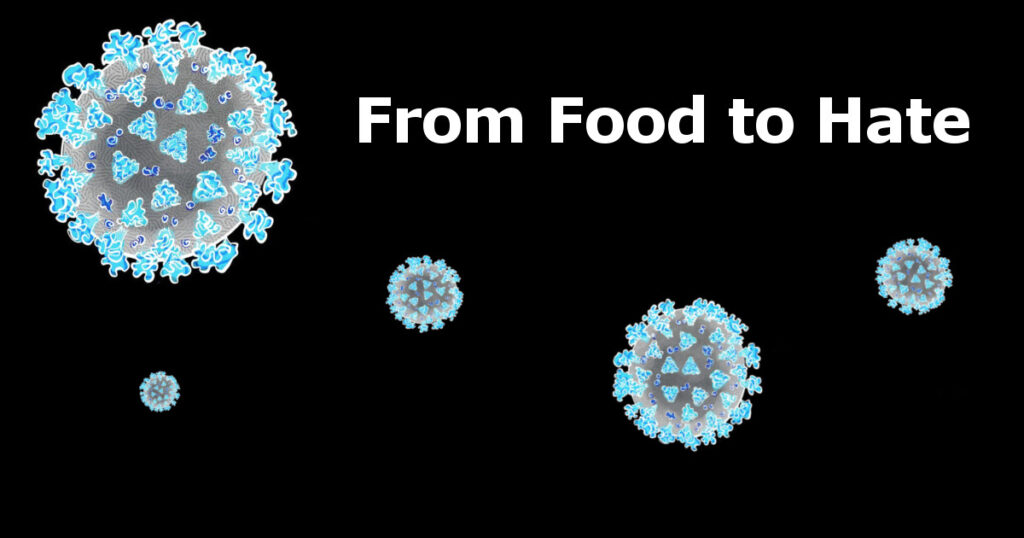
In the midst of the Coronavirus (COVID-19) there is a particular strand of anti-Chinese sentiment based around food. This is not a new phenomena, we’ve seen it in anti-Asian racism since we started operating in 2012. With Coronavirus, it’s taken on a new twist.
Example 1
An anti-Chinese post on Facebook say “if the Chinese didn’t eat EVERY kind of animal, whether it walks, crawls, swims or FLIES, shit like THIS wouldn’t happen so frequently!!!”. This is an attack on Chinese culture with a false accusation that China causes such things regular. It makes as much sense as blaming the western diet for the 2007 outbreak of foot and mouth disease which was transferred via beef.
The post also links, presumably in disgust at China, to an NBC article about a Chinese official suggesting the US Army might be responsible for the outbreak.

Example 2
Another user makes a Facebook posts which links to a YouTube video. The Facebook post reads in part: “You Fucking Chinese make me so fucking mad! Everyone are suffering of this fucking pandemic disease because of your fucking ass greedy/cruel behavior against God the Almighty!” The title of the video they share is “Pets Dogs Clubbed to Death for Chinese Restaurants” and it dates from December 2015. The video itself is part of a campaign against the use of dog meat in China.

The campaign is run by US based charities and UK based media companies. It goes beyond a clash over cultural differences regarding what animals are a proper source of food. The charities involved have documented extreme cases of torture (warning: graphic descriptions) as well as pets being stolen to add to the meat supply.
This is all occurring in China, and the government there has been trying to stop it. Some social media content seeks to use this material to suggest local Chinese restaurants are involved as a way of building hate against the local Chinese community.
Example 3
The YouTube Video from the above post documents the cruelty. It has been seen over 1.3 million times since it was posted in 2015. This is not a hate video, it is an animal rights advocacy video.

The recent comments on YouTube on this video, however, discuss Coronavirus and some promote hate by seeking to hold all Chinese people responsible or promote the idea that this would be happening in Chinese restaurants in places like Australia or the US. There is nothing to support that idea.
Comments which promote hate of China as a whole, collective punishment ranging from nuking China, to boycotts of businesses and people of Chinese heritage outside China, are all forms of hate speech. While anger is justified, advocating taking out that anger on people who had nothing to do with the cruelty is just another type of racist stereotyping.
Example 3a
“This how many people hate China”, with 1.9k people clicking the thumbs up.

Example 3b
“I don’t feel bad for China ever. Now enjoy the coronavirus you demons.” With 592 thumbs up.

Example 3c
“Never again China, never again. You committed crime against humanity with Coronovirus Pandemia….” with 19 thumbs up.

Example 3d
“I will NEVER SUPPORT another Chinese restaurant EVER again i just can’t I don’t wtf they could be cooking” with 74 thumbs up.

Example 3e
“I will not buy any Chinese product or employ any Chinese men from now” with 4 thumbs up.

Example 3f
“They’re totally disgusting. I couldn’t watch more than 30 seconds. Drop the bomb on them wipe them off the face of the Earth….. And this little virus going around the globe was no accident.. China has hell to pay.”

Anlaysis
The examples highlight how cultural differences are emphasised in order to create a “them and us” divide. They highlight how documentation of real examples of abhorrent acts committed by individuals are re-purposed into a vehicle to spread hate against a larger group than those actually responsible. They highlight how events overseas can be used to spread hate against an associated community in Australia, or in other parts of the world. They also show how once these things are done, it creates a space for public comments which move into more overt incitement to racist and discriminatory acts, or indeed advocating violence.
These are patterns we seen in other forms of hate speech as well. Finding them present here highlights that Chinese Australians may face the same sorts of abuse and discrimination, not just now but over the coming years, which have been more commonly impacting other communities.
This briefing has been prepared by Dr Andre Oboler, CEO of the Online Hate Prevention Institute, and Osiris Parikh, OHPI Analyst.
Add Your Comments and Support
Comments on this briefing can be made on this Facebook post.
The Online Hate Prevention Institute is a Registered Charity that tackles all forms of online hate. You can support our work by making a donation at https://ohpi.org.au/donate/. You can also join us on Facebook, or join our mailing list.
This article is part of our special focus on Coronavirus. For the month of April, the Online Hate Prevention Institute is running a campaign Tackling Online Islamophobia. We are also currently running a fundraiser to expand our May 2020 campaign to stop online Misogyny. The full plan for our campaigns in 2020 can be seen here.
